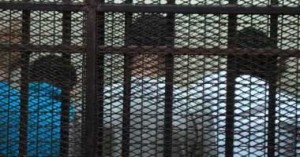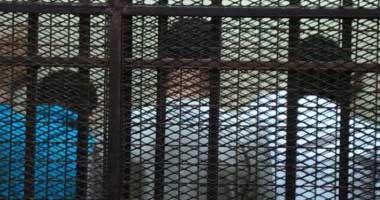 In the first step towards the trial of the perpetrators of the gang rapes and mob-sexual assaults in Tahrir square, the first hearing was held on Wednesday the 25th of June 2014 in the Sixteenth Circuit for Felonies at the New Cairo Court in order to try some of the defendants charged with committing gang rapes and assaults during the celebrations that took place in Tahrir Square for the inauguration of the New Egyptian President on the 3rd and 8th of June 2014.
In the first step towards the trial of the perpetrators of the gang rapes and mob-sexual assaults in Tahrir square, the first hearing was held on Wednesday the 25th of June 2014 in the Sixteenth Circuit for Felonies at the New Cairo Court in order to try some of the defendants charged with committing gang rapes and assaults during the celebrations that took place in Tahrir Square for the inauguration of the New Egyptian President on the 3rd and 8th of June 2014.
ONTV Channel aired live the opening of the afore-mentioned hearing revealing the names of the survivors of these crimes before the decision was taken to make these hearings closed in preservation of “Public Morals”, in addition to the fact that Al-Youm Al-Sabea Newspaper published a copies of the investigations in detail on Friday the 20th of June 2014 on its website, i.e. five days before the afore-mentioned hearing, and they also published the personal information of one of the survivors of the assaults of January 2013. This is a grave violation of the privacy of survivors, which is contradictory to the recommendations of feminists groups regarding the respect of the privacy of survivors and the confirmation of the Press Syndicate on the 13th of June 2014 that the privacy of survivors should be respected and their personal information should not be published.
Such acts also endanger the lives of concerned survivors as they are now susceptible to threats or intimidation in order to refrain from proceeding in the concerned litigation process. These acts also render them vulnerable to various forms of harassment, at a time in which they need privacy and space to start recovering from the crime they were subjected to in order to protect their physical and psychological safety.
In subsequence to this grave violation, security apparatuses must take necessary measures for the protection of survivors and making sure they are not subjected to any harm. Laws should be applied to any media mediums that breach professional ethics and rules of privacy, and those that did not obtain direct and personal approval from the survivors to air the afore-mentioned hearing live, even if the airing of the opening hearing was driven by the need to inform the public of the case, as there are international standards governing the trial and investigation of these crimes, which have to include specific measures to guarantee the safety of survivors whether during the investigations or the sessions of the trial itself.
Finally, violation of professional standards by the media at the first trial of its kind regarding crimes of sexual violence in the public space in Egypt could create a pattern in dealing with these cases in the future that will discourage survivors from completing the process of litigation, help perpetrators escape punishment, and foster the culture of disrespect for the privacy of survivors.
The undersigned organizations and groups call on the different agencies of the state to deal with this issue in a professional and responsible way that guarantees survivors’ feelings of safety and respect by the state, and ensures a fair trial for the defendants. We also assert that the necessity of holding perpetrators accountable, and the importance of defining the concerned crimes as they truly are, which are not described comprehensively in the Egyptian penal code.
Ensuring that the perpetrators of these crimes are held accountable reflects not considering this case the only one of its kind, and it is absolutely necessary to conduct thorough investigations in what happened in Tahrir Square and its vicinity since June 2012, and implement a national strategy by the state to combat violence against women, to avoid the commitment of these crimes again.
The undersigned organizations and groups:
- Nazra for Feminist Studies.
- Anti-Harassment Movement.
- Arab Network for Human Rights Information (ANHRI).
- Banat Masr Khat Ahmar (Egyptian Women are a Red Line).
- Bread and Freedom Party (Under Establishment).
- Cairo Center for Development and Human Rights.
- Cairo Institute for Human Rights (CIHRS).
- Center for Appropriate Communication Techniques for Development (ACT).
- Center for Egyptian Women’s Legal Assistance (CEWLA).
- Daughter of the Land Association.
- Egyptians against Religious Discrimination.
- El-Nadeem Centre for Rehabilitation of Victims of Violence and Torture.
- Land Center for Human Rights
- Legal Organization for the Assistance of Family and Human Rights.
- New Woman Foundation (NWF).
- Shoft Taharosh (I saw Harassment) Initiative.
- Tahrir Bodyguard.
- The Egyptian Feminist Union.
Share this Post

